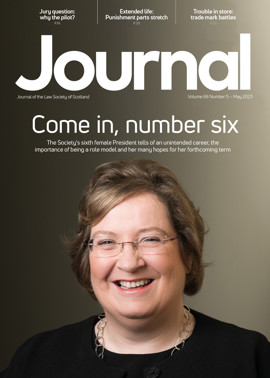Time to check your terms

Variable levels of clarity and accessibility in solicitors’ terms of business letters have been found by the Scottish Legal Complaints Commission, in a new report.
Taking a sample of 80 letters, the SLCC considered to what extent they complied with Law Society of Scotland rules and whether an average client would be likely to read and understand them. It reports generally good compliance with the basic requirements. However, its sample showed “a real variation in the extent to which firms made their terms of business letters clear, accessible, accurate, and a useful tool for effective communication with the client”.
Practice rule B4 says that a firm must provide information in writing with an outline of the work to be done, an estimate of total fees and outlays, the level of any legal aid contribution, the name of the person who will do the work, the person to contact in the firm with any concerns, and signposting to the SLCC if concerns have not been resolved. The report considers each of these in turn, along with other terms found.
Findings
On work to be done, about 25% of letters had very brief headings such as “Conveyancing”, and some contained irrelevant and potentially confusing information about different work. Only 12% “stood out as a comprehensive, well-worded and personalised indication both of the scope of instructions and what was not included”.
Most said it would be difficult to predict the final time and cost of legal work. “Even with this rider, we felt that many could have benefitted from including even a ballpark range”, the report states. After noting various practices that left matters unclear, it concludes: “The clearest explanations on fees that we saw were also the simplest: ‘For this transaction we will charge £x per hour’, or ‘For emails, correspondence and documents, we charge for each 100 words’.”
While legal aid assistance was well explained where relevant, information on legal aid was on occasion included, “often in great detail”, though not relevant to the transaction.
With named practitioners, the SLCC suggests that clients might be assured that if another person has to deal with the instructions, they will be fully conversant with the file.
Regarding complaint processes, “It’s worth remembering that even if a firm attempts to prescribe that every stage of a complex or lengthy investigation process must be completed internally, a complainer has the right to approach the SLCC if the complaint remains unresolved 28 days after it was first raised to the firm.”
Firms “did not do so well on the requirement to signpost the SLCC and give its correct contact details, since less than 15% of our sample had all information both present and correct”. The report includes suggested wording, also referring to time limits – which some firms misstate.
Among other terms, several firms used wording “that may not comply with Money Laundering Regulations or that might be inconsistent with current Law Society of Scotland guidance”.
Recommendations
The report urges firms to:
- Ensure that your terms and the standard of work that you do both match up to your marketing. Your marketing, policies and terms should all be treated as living documents, reviewed and revised regularly to ensure they are still relevant to your clients and your current way of working.
- Treat your terms as your first and an ongoing opportunity to communicate well with your client. Use them to set out how you’ll work together, and refer back to them when you need to throughout the transaction. Even if something is mentioned in the terms of business, you’d be well advised to explain the full implications at the time it becomes relevant during the transaction, to ensure that you’re communicating as well as you could with the client.
- As far as possible, try to make your terms clear, concise and easy to read. Try to imagine a friend or family member without any legal knowledge receiving them, and read them as if through their eyes. Pay attention to wording, spacing, sentence length and logical grouping of information. Personalising your terms to the transaction will help with this.
- Take extra care in explaining fees and charging – many of the complaints we see stem from misunderstandings and miscommunication here. Don’t assume your client will understand or be familiar with a charging method not used in many other types of transaction, or know how routine or otherwise their case might be.
- Check the accuracy of references to the right to complain to your firm and to the SLCC. Use our suggested wording to make that straightforward. You should never attempt to restrict the right to complain, to restrict or place conditions on the posting of online reviews, or impose unduly onerous processes. A complaints process that is fully accessible is more likely to lead to amicable resolution of any concerns.
Susan Williams, the SLCC’s Best Practice adviser, said: “While some firms had worked hard to make their terms clear and accessible, we felt only about a third of our sample were likely to be easily read and understood by clients. We found the sections on fees and charging were often particularly likely to be confusing for clients.”
She added: “We urge firms to look again at their own letters and take the time to update and improve them for the benefit of their clients and their business.”
The report is available on the SLCC’s website
Perspectives
Features
Briefings
- Civil court: Spotlight on the Sheriff Appeal Court
- Employment: Must do better – the s 23 approach
- Human rights: Crime, detention and mental health issues
- Pensions: A question of tax
- Scottish Solicitors' Discipline Tribunal: May 2023
- Family: The slide rule of grave risk
- In-house: A route to diversity






